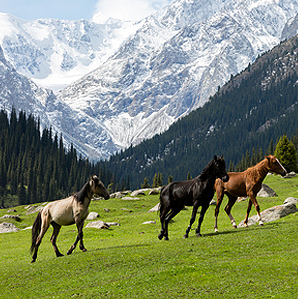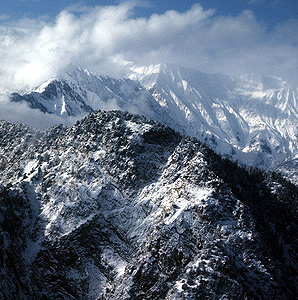In the eastern buffer zone of Wangchuck Centennial National Park, a climate-smart village is piloting comprehensive climate adaptation strategies that will serve as a model for neighboring villages and beyond in Bhutan.
This demonstration project in a small mountain village of 26 households has increased resident's adaptive capacity through an integrated suite of climate adaptation activities. These activities include: vegetable farming in greenhouses, solar fencing to reduce crop loss to wildlife depredation, reforestation of water source areas, improved water storage and delivery facilities, and capacity building for local residents all of which demonstrate simple actions mountain communities can take to improve their livelihood security in the face of a changing climate.
This demonstration project in a small mountain village of 26 households has increased resident's adaptive capacity through an integrated suite of climate adaptation activities. These activities include: vegetable farming in greenhouses, solar fencing to reduce crop loss to wildlife depredation, reforestation of water source areas, improved water storage and delivery facilities, and capacity building for local residents all of which demonstrate simple actions mountain communities can take to improve their livelihood security in the face of a changing climate.
HIGHLIGHTS
2 climate-smart watershed management plans were developed for critical tributary basins in the Nika Chhu and Kuri Chhu river watersheds.
57 households adopted planting of fodder crops for winter stall feeding of livestock as one adaptation to reduce grazing pressure on natural pastures and improve watershed management.
Mapping 1070 wetlands using satellite imagery to inventory Bhutan's wetland resources and inform management interventions for these sites.
57 households adopted planting of fodder crops for winter stall feeding of livestock as one adaptation to reduce grazing pressure on natural pastures and improve watershed management.
Mapping 1070 wetlands using satellite imagery to inventory Bhutan's wetland resources and inform management interventions for these sites.

A lasting impact
By sponsoring a model climate-smart village, providing climate adaptation training for a wide range of stakeholders, and funding development of demonstration watershed management plans and vulnerability assessments, AHM Project work in Bhutan has been informing national initiatives on climate change, water resources, and snow leopard habitat conservation, ensuring continued forward progress on these issues in the future.
Discover the Landscapes
This website is made possible by the generous support of the American people through the United States Agency for International Development (USAID). The contents are the responsibility of WWF and do not necessarily reflect the views of USAID or the United States Government.





